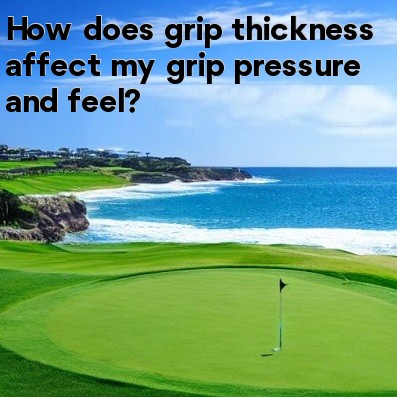
In golf, How does grip thickness affect my grip pressure and feel?
Grip thickness plays a crucial role in golf as it directly affects your grip pressure and overall feel. The right grip thickness allows you to have better control over your shots and can significantly improve your performance on the golf course. Let's dive deeper into how grip thickness affects your grip pressure and feel.
Grip Pressure
When it comes to grip pressure, finding the correct balance is essential. Gripping the club too tightly can lead to tension in your hands, arms, and even your whole body, resulting in less fluid swings and a higher likelihood of mishits.
Thicker grips have the advantage of reducing the tendency to grip the club too tightly. This is because a thicker grip fills up the hands, naturally forcing a looser hold. It helps to prevent excessive squeezing and promotes a more relaxed grip, allowing for better clubhead control and more consistent shots.
On the other hand, thinner grips can have the opposite effect on grip pressure. With less bulk to hold onto, golfers tend to squeeze the club tightly, leading to increased tension and a potential loss of control. Therefore, for players who already tend to grip the club too tightly, a thicker grip may be beneficial in reducing grip pressure and allowing for a more comfortable swing.
Feel
The feel of the golf club grip is another essential factor that affects your overall performance. Grips that feel comfortable and offer good feedback can greatly enhance your ability to make precise shots.
Thicker grips provide more cushioning and can help absorb shock during impact, reducing vibrations that can be felt in your hands and wrists. This not only enhances overall comfort but also improves shot feedback. With a thicker grip, you are more likely to feel the clubhead throughout the swing, enabling you to have better control over your shots.
Conversely, thinner grips provide a more direct connection to the clubhead, offering a different kind of feel. They allow for a better sense of the clubhead position and can provide a greater level of control for players who prefer a more hands-on approach. Thinner grips may also be preferred by those with smaller hands, as they offer a better fit and allow for a lighter grip pressure.
Ultimately, the choice of grip thickness is a matter of personal preference and comfort. Golfers should experiment with different grip thicknesses to find the one that suits them best. It is recommended to try out various grip thicknesses and get feedback from a club fitting professional to ensure the perfect fit for your individual needs and playing style.
Conclusion
Grip thickness is an important aspect to consider when it comes to your golf game. It directly affects your grip pressure and overall feel, both of which are crucial for optimal performance on the course. Thicker grips can help reduce grip pressure and promote a more relaxed hold, while also providing better comfort and shot feedback. Thinner grips, on the other hand, offer a more direct connection to the clubhead and are preferred by players who seek a hands-on feel. Ultimately, finding the right grip thickness for you will contribute to better control, more consistent shots, and an overall improved golfing experience.





